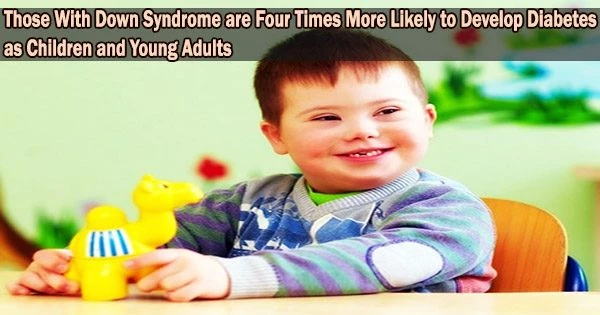According to recent research performed by Queen Mary University of London and King’s College London, children and young adults with Down Syndrome are four times more likely to receive a diabetes diagnosis.
The study, which was written up in Diabetes Care, looked at over 40,000 adults without Down syndrome and slightly under 10,000 persons with it. The population-based analysis used data from the UK Clinical Practice Research Datalink, one of the most widely used databases, spanning three decades (from 1990 to 2020).
In one of the largest Down Syndrome cohorts in the world, the researchers are examining the prevalence of diabetes and obesity in Down Syndrome across the life span for the first time.
Researchers discovered that children with Down syndrome, aged five to 14, have a ten times higher risk of developing type 2 diabetes than children without the disorder. Given how susceptible this population is and the consequences diabetes can bring in later life, it is suggested that annual health checks for children with Down syndrome need to more closely monitor for excess weight, obesity, and early indicators of diabetes to help diagnose diabetes as early as possible.
An extra chromosome causes the disorder known as Down syndrome. In the body, chromosomes are discrete “packages” of genes. They control how a baby’s body develops during pregnancy and after birth, determining how it will look and work. But even those who with Down syndrome can lead happy, healthy lives.
Currently there is a sizeable gap in research into the condition, which affects around 40,000 people in the UK. To help plug this gap in knowledge, we are conducting further research into how genetics affects a person with Down Syndrome’s predisposition to diabetes and obesity, and hope to shed further light on this important medical issue.
Dr. Li Chan
There are numerous options to assist in overcoming the obstacles associated with this illness thanks to recent medical advancements as well as institutional and cultural support for people with Down syndrome and their families. People with Down syndrome usually have an IQ (a measure of intelligence) in the mildly-to-moderately low range and are slower to speak than other children.
The increased risk for those much younger than this highlights the significance of vigilant, early-stage monitoring. The study found that people with Down Syndrome are typically diagnosed with diabetes much earlier; the average age of diagnosis for someone with Down Syndrome was 38 years old, compared to 53 in those without Down Syndrome.
The main causes of this are believed to be genetics and high body weight. People with Down syndrome were found to have higher BMIs and peak at younger ages, increasing their chance of developing type 2 diabetes sooner. Due to additional chromosomes and immune system problems, type 1 diabetes is also more likely in people with Down syndrome.
Dr. Li Chan, senior author, Reader in Molecular Endocrinology and Metabolism and Consultant Paediatric Endocrinologist at Queen Mary University of London said: “This study highlights the importance of early screening for diabetes and weight issues in people with Down Syndrome, especially children and young adults.”
“Currently there is a sizeable gap in research into the condition, which affects around 40,000 people in the UK. To help plug this gap in knowledge, we are conducting further research into how genetics affects a person with Down Syndrome’s predisposition to diabetes and obesity, and hope to shed further light on this important medical issue.”
Professor Andre Strydom, corresponding author, Professor in Intellectual Disabilities at King’s College London said:
“This is the largest study ever conducted in Down Syndrome patients to show that they have unique needs with regards to diabetes and obesity, and that screening and intervention including a healthy diet and physical activity at younger ages is required compared to the general population.”
“The results will help to inform the work of NHSE’s LeDeR programme to reduce inequalities and premature mortality in people with Down Syndrome and learning disabilities.”
















